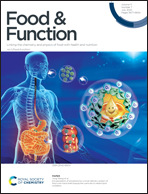Ameliorative effects and molecular mechanisms of vine tea on western diet-induced NAFLD†
Abstract
Non-alcoholic fatty liver disease (NAFLD) is a disease that is prevalent worldwide, and its prevention by dietary administration has recently been considered as an important strategy. In this study, we administered mice with vine tea polyphenol (VTP) extracted from Ampelopsis grossedentata, a Chinese herb, to investigate the preventive effect on western diet (WD)-induced NAFLD. Male C57BL/6N mice were fed either a normal diet (ND) or WD with or without VTP for 12 weeks. The results revealed that VTP supplementation decreased the serum levels of cholesterol and triglycerides, and reduced the accumulation of hepatic lipid droplets caused by WD. Molecular data revealed that VTP enhanced fatty acid oxidation by reactivating the WD-suppressed phosphorylation of AMP-activated protein kinaseα (AMPKα) and the expressions of peroxisome proliferator-activated receptor alpha (PPARα), carnitine palmitoyl transferase IA (CPT1A) and cytochrome P450, family 4, subfamily a1 (CYP4A1). VTP inhibited hepatic lipogenesis by reducing the WD-enhanced level of mature sterol regulatory element-binding protein 1 (SREBP1) and fatty acid synthase (FAS). Moreover, VTP activated nuclear factor (erythroid-derived 2)-like 2 (Nrf2)-mediated expressions of hemeoxygenase-1 (HO-1) and quinone oxidoreductase (NQO1), and reduced hepatic TBARS levels to prevent hepatic oxidative stress. On the other hand, VTP also increased intestinal zonula occludens-1 (ZO-1) expression and the relative abundance of gut Akkermansia, and reduced the ratio of Firmicutes/Bacteroidetes. Thus, VTP might prevent WD-induced NAFLD by balancing fatty acid oxidation and lipogenesis, hepatic oxidative stress, and gut microbiome, at least. These results suggest that vine tea, containing a high content of the bioactive compound dihydromyricetin, is a potential food resource for preventing NAFLD.



 Please wait while we load your content...
Please wait while we load your content...